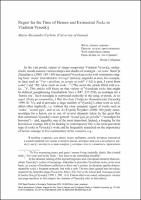Chapter Regret for the Time of Heroes and Existential Toska in Vladimir Vysockij
| dc.contributor.author | Curletto, Mario Alessandro | |
| dc.date.accessioned | 2022-06-01T12:06:36Z | |
| dc.date.available | 2022-06-01T12:06:36Z | |
| dc.date.issued | 2015 | |
| dc.identifier | ONIX_20220601_9788866558224_6 | |
| dc.identifier.issn | 2612-7679 | |
| dc.identifier.uri | https://library.oapen.org/handle/20.500.12657/55823 | |
| dc.description.abstract | In the poetic legacy of Vladimir Vysockij, feelings of nostalgia are expressed in diverse ways, conveying various shades of boredom, longing, and melancholy. A special role is played in Vysockij's oeuvre by the so-called “longing for a heroic era”, which is sometimes expressed explicitly, but more often found in the implicit representation of “longing for a heroic deed”. Vysockij's conception of the heroic deed or feat (podvig) casts this as a moral and spiritual state that contrasts sharply with the surrounding world and with everyday life. While Vysockian "longing for a heroic deed" can be associated with specific geographic contexts (including mountains, the taiga, glaciers in the North), this articles argues that it was the peculiar chronotope of the Great Patriotic War that served as the quintessential context for the heroic feat in Vysockij's universe. | |
| dc.language | English | |
| dc.relation.ispartofseries | Biblioteca di Studi Slavistici | |
| dc.subject.other | Vysockij | |
| dc.subject.other | nostalgia | |
| dc.subject.other | toska | |
| dc.subject.other | heroism | |
| dc.subject.other | Soviet songwriter | |
| dc.title | Chapter Regret for the Time of Heroes and Existential Toska in Vladimir Vysockij | |
| dc.type | chapter | |
| oapen.identifier.doi | 10.36253/978-88-6655-822-4.05 | |
| oapen.relation.isPublishedBy | bf65d21a-78e5-4ba2-983a-dbfa90962870 | |
| oapen.relation.isbn | 9788866558224 | |
| oapen.series.number | 28 | |
| oapen.pages | 32 | |
| oapen.place.publication | Florence |

